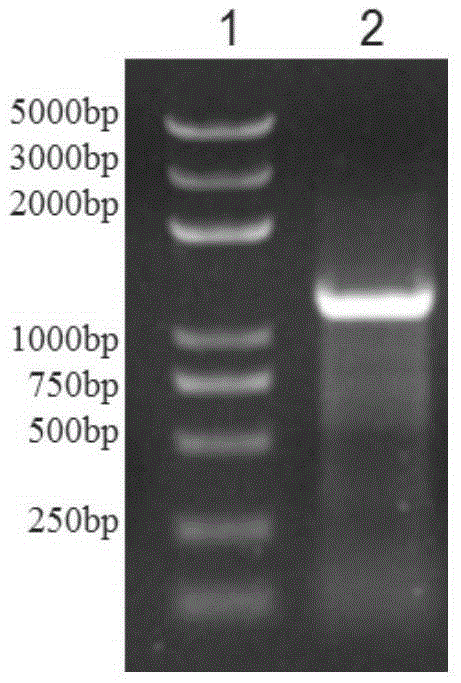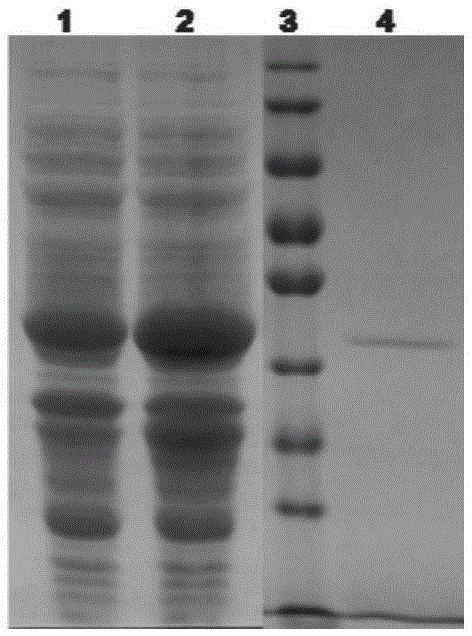Incision beta-1,3-glucanase coding gene, as well as enzyme, preparation method and application thereof
A technology of glucanase and coding genes, which is applied in botany equipment and methods, biochemical equipment and methods, applications, etc., and can solve problems such as unreasonable use, rampant pests and diseases, and pesticide residues
- Summary
- Abstract
- Description
- Claims
- Application Information
AI Technical Summary
Problems solved by technology
Method used
Image
Examples
Embodiment 1
[0046] Example 1 Endo-β-1,3-glucanase full-length gene cloning
[0047] Genomic DNA of Microbacterium fibroblasts was extracted according to the operation steps of Genomic DNA Purification Kit (Thermo, LOT 00105781). After performing multiple sequence alignment analysis on the endo-β-1,3-glucanase gene sequence in The National Center for Biotechnology Information (NCBI) database, a degenerate primer glu-F was designed: 5'-GATATACATATGGCRCCSGGSGACMTCSTSTGGTCSGACGAG-3';glu -R: 5'-GTATAACTCGAGGARSGTCCACTGCTGGKYGGTCGWGCCGTKGCA-3', using the extracted genomic DNA of Microbacteria fibroblasts as a template, amplify the gene sequence encoding the mature protein of endo-β-1,3-glucanase (excluding the signal peptide Gene). The PCR reaction conditions were: 94°C for 2 min, 1 cycle; 98°C for 30 s, 68°C for 30 s, 0.5°C for each cycle, 72°C for 2 min, 30 cycles; 72°C for 5 min, 1 cycle. PCR products were analyzed by agarose gel electrophoresis (see figure 1 ), the target fragment was re...
Embodiment 2
[0048] Example 2 Endo-β-1,3-Glucanase Gene Sequence Analysis
[0049] The results of the sequencing were analyzed using the Basic Local Alignment Search Tool (BLAST) in the GenBank database, and the Vector NTI Suite 8.0 software was used for multiple sequence alignment and sequence information analysis.
[0050] The coding region of the obtained endo-β-1,3-glucanase gene (named gluE) is 1179 bp long, and its nucleotide sequence is shown in SEQ ID NO 1. gluE encodes 412 amino acids and a stop codon, its amino acid sequence is shown in SEQ ID NO 2, the theoretical protein molecular weight is 44kDa, and the predicted isoelectric point is 6.33. The amino acid sequence of gluE has the highest identity (99%) with the β-1,3-glucanase (Accession No. activity research. The domain characteristics of gluE are more similar to members of the glycoside hydrolase 16 family, thus indicating that gluE is a new member of the GH16 family.
Embodiment 3
[0051] Embodiment 3 Recombinant expression and purification of gluE gene in Escherichia coli
[0052] In order to facilitate the recombinant expression of the gene, NdeI and XhoI restriction sites were respectively introduced into the designed upstream and downstream primers. The PCR amplified product and the expression vector pET28a were digested with NdeI and XhoI, respectively. After the digested products were separated by electrophoresis and recovered from the gel, the PCR product that had undergone double digestion and the pET28a vector that had also undergone double digestion were digested with T 4 DNA ligase connection (ligation system: 5mL (T 4 DNA Ligase 0.5mL, 10′T 4 DNALigase Buffer 0.5mL, pET28a 2.5mL, PCR product 1.5mL), connection conditions: room temperature connection. ). 5 mL of the ligation product was transformed into E. coli TOP10 competent cells, spread on solid Luria-Bertani medium containing 100 μg / mL ampicillin, and cultured at 37°C for 12-16 hours. ...
PUM
| Property | Measurement | Unit |
|---|---|---|
| diameter | aaaaa | aaaaa |
| diameter | aaaaa | aaaaa |
| molecular weight | aaaaa | aaaaa |
Abstract
Description
Claims
Application Information
 Login to View More
Login to View More - R&D
- Intellectual Property
- Life Sciences
- Materials
- Tech Scout
- Unparalleled Data Quality
- Higher Quality Content
- 60% Fewer Hallucinations
Browse by: Latest US Patents, China's latest patents, Technical Efficacy Thesaurus, Application Domain, Technology Topic, Popular Technical Reports.
© 2025 PatSnap. All rights reserved.Legal|Privacy policy|Modern Slavery Act Transparency Statement|Sitemap|About US| Contact US: help@patsnap.com



